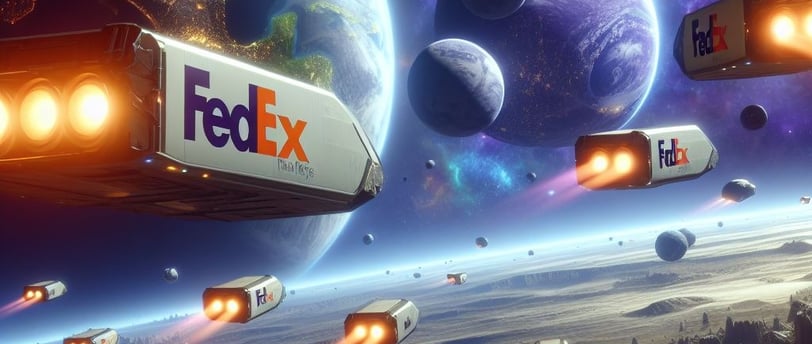StingrayLink: Supply Chain 2050-- A Quantum Leap into a Futuristic Ecosystem
Interplanetary trade? What?
Omar Rebaza
1/18/20242 min read


As we step into the mid-century, I wanted to dedicate this piece to FedEx. It is 2050, global supply chains are poised to undergo a revolutionary transformation that surpasses all previous expectations. The amalgamation of cutting-edge technologies, sustainable practices, and a globally connected ecosystem will redefine the very essence of supply chain management. In this blog, we'll explore the groundbreaking trends and expectations for the supply chain in the year 2050.
Quantum Supercomputing Redefines Optimization: A New Era of Computing: Quantum supercomputing will revolutionize supply chain optimization in 2050. The unparalleled computational power of quantum systems will tackle complex problems with unprecedented speed, enabling real-time decision-making for route optimization, demand forecasting, and resource allocation. This shift will usher in a new era of efficiency and adaptability.
Synthetic Biology Drives Hyper-Personalization: A Bio-Inspired Manufacturing Revolution: The supply chain will witness a bio-inspired manufacturing revolution driven by synthetic biology. Tailored products created through gene editing and synthetic processes will lead to hyper-personalization. The ability to engineer biological materials at a molecular level will redefine how goods are produced, introducing a level of customization that was once inconceivable.
Spatial Computing Transforms Warehousing and Fulfillment: A Revolution in Space and Time: Spatial computing will transform warehousing and fulfillment operations in 2050. Augmented reality and holographic displays will create a three-dimensional workspace, optimizing storage, picking, and packing processes. Warehouses will become dynamic, adaptive environments, enhancing operational efficiency and reducing errors.
Quantum Internet and Secure Blockchain: Unprecedented Connectivity and Trust: The quantum internet, coupled with secure blockchain technology, will provide unparalleled connectivity and trust within the supply chain. Quantum communication will ensure secure and instantaneous data transfer, while blockchain will continue to serve as an immutable ledger, guaranteeing transparency, traceability, and authenticity across the entire supply chain network.
Autonomous Supply Chain Ecosystems: A Symphony of Smart Machines: The supply chain of 2050 will operate as a self-contained, autonomous ecosystem. Smart machines, guided by advanced AI and robotics, will seamlessly collaborate, adapting to changing conditions in real-time. These autonomous ecosystems will require minimal human intervention, ensuring efficiency, resilience, and adaptability in an ever-evolving global landscape.
Biodegradable and Circular Materials Dominate: A Sustainable Revolution: Sustainability will be at the forefront of supply chain practices in 2050. Biodegradable and circular materials will dominate the manufacturing landscape, reducing waste and minimizing environmental impact. Closed-loop systems will ensure that products are designed with recycling and repurposing in mind, fostering a circular economy within the supply chain.
Interplanetary Trade and Space-Based Resources: A Cosmic Commerce Frontier: Interplanetary trade and space-based resource utilization will become a reality in 2050. Spaceports, lunar manufacturing facilities, and resource extraction from celestial bodies will open new frontiers for commerce. The supply chain will extend beyond Earth, leveraging the vast resources of our solar system for sustainable and innovative practices.
Neural Integration for Mind-Driven Logistics: A New Dimension of Human-Machine Collaboration: Neural integration will take human-machine collaboration to new heights, allowing logistics operations to be driven by the human mind. Brain-machine interfaces will enable supply chain professionals to interact with systems seamlessly, enhancing decision-making and problem-solving capabilities. This fusion of human intuition and machine efficiency will redefine the nature of supply chain operations.
The supply chain of 2050 is not just a projection; it's a bold vision that transcends the boundaries of today's reality. As businesses embark on this transformative journey, a commitment to ethical innovation, sustainable practices, and global collaboration will be essential. The journey towards 2050 requires a pioneering spirit, a willingness to embrace the unknown, and a dedication to shaping a supply chain that not only meets the needs of the future but also pioneers new frontiers in the world of commerce.
